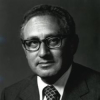Henry A. Kissinger

Henry A. Kissinger
Henry Alfred Kissingeris an American diplomat and political scientist. He served as National Security Advisor and later concurrently as United States Secretary of State in the administrations of presidents Richard Nixon and Gerald Ford. For his actions negotiating the ceasefire in Vietnam, Kissinger received the 1973 Nobel Peace Prize under controversial circumstances, with two members of the committee resigning in protest. Kissinger later sought, unsuccessfully, to return the prize. After his term, his advice has been sought by world leaders...
NationalityGerman
ProfessionStatesman
Date of Birth27 May 1923
CountryGermany
Because of the axiom that guerrillas win if they do not lose, stalemate is unacceptable, ... the military challenge in Iraq is more elusive.
I see the future of China as growth. I think that historically China has often gone through periods of consolidation, and then periods of sort of weakening central authority. They undoubtedly face tremendous challenges.
Like any developing country, it has an inequality of wealth. In the Chinese case, it is particularly [pronounced] by the fact that they decided they couldn't make the whole country move forward simultaneously, so they've started region by region. So the interior regions are much less well off than the coastal regions. And this is certainly a huge challenge, because it produces a flow of populations from the poorer regions to the richer regions.
China had never had to deal in a world of countries of approximately equal strength, and so to adjust to such a world, is in itself a profound challenge to China, which now has fourteen countries on its borders, some of which are small, but can project their nationality into China, some of which are large, and historically significant, so that any attempt by Chinese to dominate the world, would involve in a disastrous for the peace of the world.
I have said there are three principles that should be followed. One, we should maintain the "one China" policy that every American president has articulated, including President Reagan. Secondly, we should make clear that we want a peaceful resolution. And three, Taiwan should not challenge that arrangement in a way that will provoke a conflict. Those are three perfectly clear principles. I haven't used any of the other slogans.
There are some people who think that at some time in the future, China may challenge us for supremacy in the Pacific, and therefore, what do we do today to prevent that? And you, of course, will say that we will try to thwart any economic progress in China. If we engaged in such a policy, we would turn a billion-plus people into nationalist opponents of the United States.
I have been observing China for more than 30 years and am impressed how logically and wisely it tackles its problems. Obviously the international system could be unbalanced by China's rising power - if we don't prepare ourselves for the new competitive situation, that is. But it is an economic challenge, not aggression on the level of Hitler.
I want to get into the President's head some idea of what he can do. If military actions are recommended to him for decision, I want him to know what he is doing when he decides.
Congress can't do much more damage to us than they already have. To this extent we're liberated to do what is right. ... Our successors will be living in a nightmare if we don't do what is right.
an occasion to blow off their frustrations on an issue on which they didn't look as if they are begging (the United States) for help.
a review of withdrawal strategy ... seems in order.
My heart goes out to the president because I've served in an administration that faced a very divided country in a very difficult set of circumstances.
Ninety percent of all politicians give the other ten percent a bad reputation.
I'm confident John Bolton will bring peace to the world before he brings peace to his relations with The New York Times,